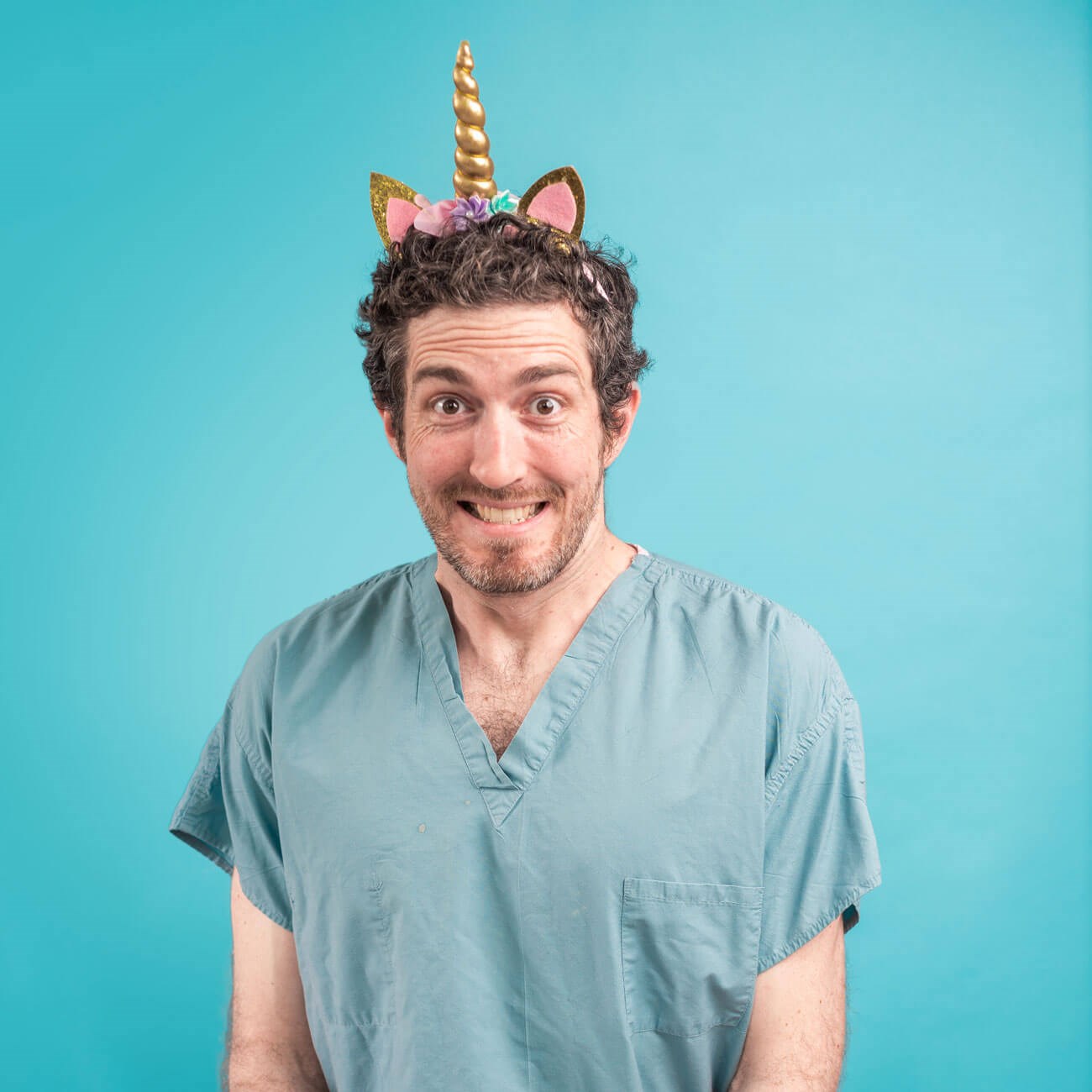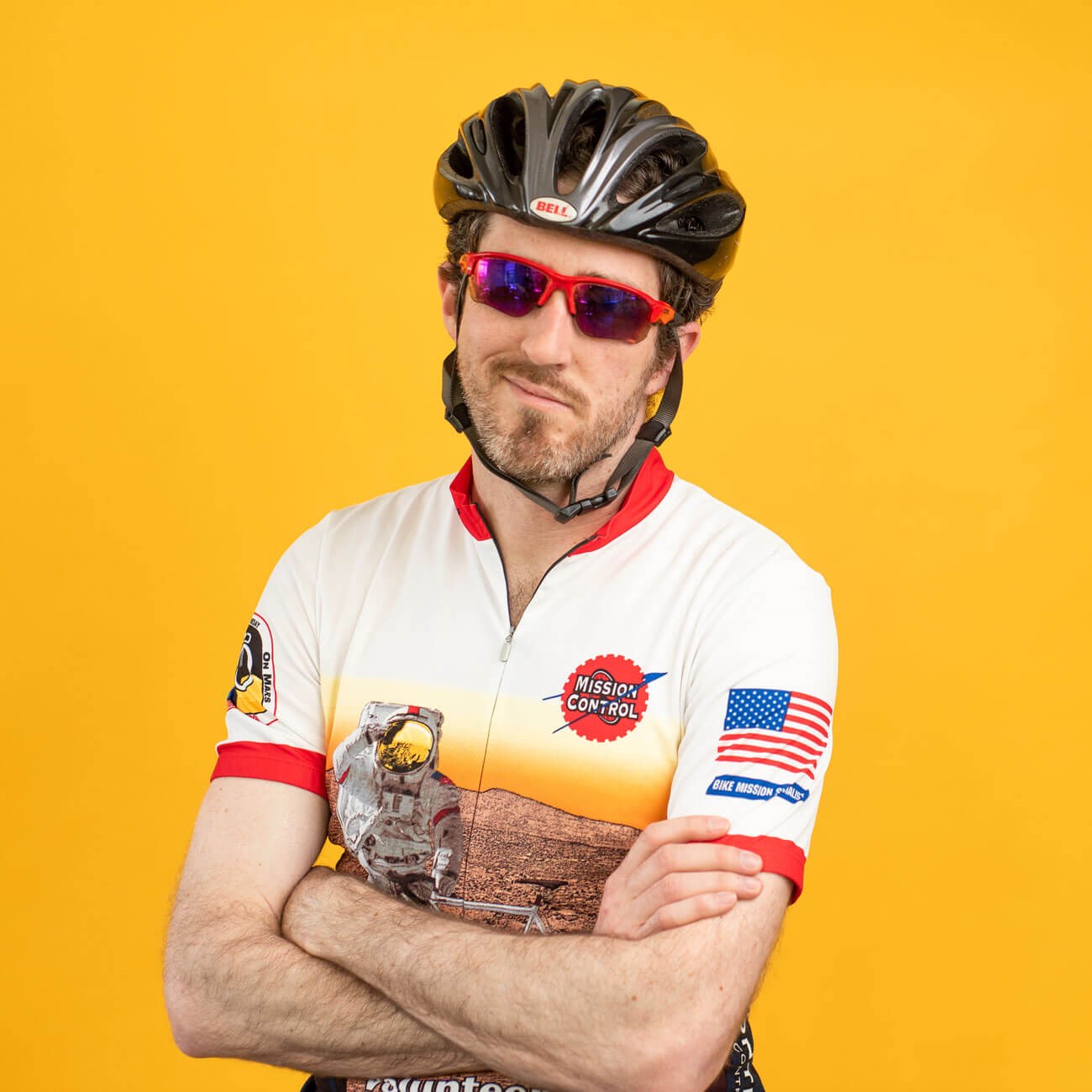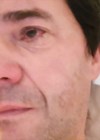Peter Cackett spoke to ophthalmologist and social media sensation Dr Glaucomflecken about his early days in comedy, the role satire can play in impacting medical governance, and where he might take his brand of medical comedy next.
It was towards the latter half of 2019 that I first became aware of TikTok, the video sharing social networking service, when I enquired of my daughter why she was endlessly scrolling on her mobile phone.

Dr Glaucomflecken’s Neurologist.
Shortly afterwards, in the summer of 2020, just as the first pandemic lockdown was lifting, a medical colleague forwarded me a TikTok video by one “Dr Glaucomflecken”. It made me laugh so much that I instantly became part of the growing bevy of social media followers of Dr Glaucomflecken, which across the combined platforms of Youtube, Twitter and TikTok currently number over 3 million.
For those who are still unaware of Dr Glaucomflecken, he is the alter ego of Will Flanary, a practising ophthalmologist and comedian from Portland, Oregon. I arranged to meet with him at this year’s American Academy of Ophthalmology meeting in Chicago, to discover more about the man behind the internet celebrity.
He has just finished giving an early morning lecture to the minority students in ophthalmology group. Once he has obliged with all the requests for selfies from adulating fans waiting outside, of which I must confess I was one, we find a relatively quiet place to sit down and conduct the interview. To get us started, my first question to him, obviously, is if he ever thought he would be destined for fame on this scale.
“No not like this,” he replies, “I never thought I would be recognised at the airport and on the street walking around town, it’s kind of surprising.”
Flanary first started doing comedy aged 17 at the Laff Stop club in Houston, having been introduced by a friend of his who was doing stand-up there at the time. He was drawn to comedy from a young age, and discovered he had a natural talent for being funny, always making his friends laugh and playing the class clown. He has never had any mentors or formal training, but rather honed his skill by watching a lot of comedy. His main influences growing up were David Letterman on The Late Show, Seinfeld, and Norm Macdonald from Saturday Night Live.

Dr Glaucomflecken’s Paediatrician.
Initially, his comedy content was not related to medicine, but drew on his background and his family. His dad was an engineer, his mum was a teacher, and he came from Irish roots, so his jokes drew from growing up in this household. I ask if he can remember an example of some of his early material and he recalls the first joke that he ever told that always got a good laugh:
“When people ask about my background, I tell them that I’m Irish, which I am reluctant to do because what is the first thing anyone thinks about when they think of the Irish?”
Everyone in the audience would shout out “Drinking!” and “Beer!”.
Then I would reply:“That’s right, the Great Potato Famine of the 1840s.”
Flanary spent a lot of time at the Laff Stop with a moderate amount of success. However, there came a point when he had to decide on whether he wanted comedy to be his future career. He looked around the club at the middle-aged men, amateurs still trying to make a living from comedy, and thought it seemed really, really, hard.
So, as he explains: “I went the much easier route of becoming a doctor.”
He continued doing stand-up comedy through college at Texas Tech and at Dartmouth medical school. It was at Dartmouth that Flanary had his epiphany, deciding to do ophthalmology.
“I went from a surgery rotation where I was doing 12-hour days to an ophthalmology rotation where I got a lunch break, and I saw that there were reasonable hours. It’s like ‘oh, I can do that and do surgery, that’s cool’.”
During his third year of medical school, his comedy was interrupted by a diagnosis of testicular cancer which was successfully treated. To cope with the emotional and mental trauma of this episode, he got back into stand-up comedy.
"Even if what I am doing is not going to directly change things, which it’s not, I mean no one is going to make a change based on someone putting out a comedy video, but if it gets the right people angry and motivates other people then it can be a vessel for change"
However, in the third year of ophthalmology residency at the University of Iowa he describes being “one of the lucky one to two percent of people with testicular cancer who get it in the other testicle. I’m really good at finding my own testicular cancer.”

Dr Glaucomflecken’s Psychiatrist.
On this occasion however, following recovery, he was not able to do stand-up because he was so busy, and “Iowa is not exactly a comedy hotbed”. So, in 2016 he turned to social media, and it was a friend who directed him to Twitter where he could tell jokes with an open audience. This is also where Dr Glaucomflecken was born, but in the early stages his comedy had a very small, niche audience. An early example of one of his jokes is one he posted from the Association for Research in Vision and Ophthalmology (ARVO) meeting:
A drusen researcher just called another drusen researcher a “pseudo-drusen researcher” #ARVO2016 #ARVOfights
“No one else was really combining medicine and humour on social media at the time,” he explains. “There was no blueprint of how to do this, so I made mistakes. Eventually I figured out what I could and couldn’t make fun of. It was a learning process, and I eventually got the tone right. It’s different from a comedy club audience, it is a totally different thing.”
Throughout the learning process of Flanary’s comedy he has been working out how medical can he get before he loses the non-medical audience.
In the Spring of 2020, during the height of the first COVID-19 lockdown, Flanary found TikTok, and thus Dr Glaucomflecken came to life in video format. Just as he started posting Dr Glaucomflecken videos, he suffered another medical issue. His wife Kristin woke up one night in May 2020 to find him taking agonal breaths and unresponsive. He had gone into cardiac arrest.
She performed CPR until a paramedic arrived to shock him back into sinus rhythm. He informs me that my assumption that she is not an ophthalmologist, give she performed successful CPR on him, is correct. He awoke later in an ICU, and has now been fitted with a subcutaneous defibrillator.
Since his discharge, and a subsequent video slating the US medical insurance industry based on his own his personal experience, which really resonated with the public, Dr Glaucomflecken has become a social media phenomenon. Through his videos, Flanary satirises the absurdities of medicine and the US healthcare system. One of his main issues is with the corporatisation of medicine.
“You have a fundamental problem when you view human health as a way to make a profit.”
I ask Flanary if he believes that now he is in a powerful position as a social media influencer, his comedy may bring about change.
“Satire does bring attention to an issue but in my opinion, it doesn’t go much further. It’s something that I struggle with. Is what I’m doing a net benefit, or am I just telling these jokes and people are saying, “that sucks”, and forgetting about it?”
However, he was recently informed, by someone that worked high up in one of the insurance companies, that the Chief Operating Officer had seen one of his prior authorisation (insurance delay tactic) videos, and it had made them very angry, and they had actually held a meeting about it. This changed Flanary’s perspective.
“Even if what I am doing is not going to directly change things, which it’s not, I mean no one is going to make a change based on someone putting out a comedy video, but if it gets the right people angry and motivates other people then it can be a vessel for change.”

Dr Glaucomflecken’s ER Doctor.
Through his videos he has also developed a whole hospital of Glaucomflecken characters to poke fun at. These include the condescending Neurologist, the Orthopaedic bro, and of course the under-worked Ophthalmologist. He finds his expressive face helps bring the different characters to life. He records the videos himself and tries to create two per week, showing each video to his wife before posting.
“She is a tough critic so if she laughs, I know it’s going to be a really good video.”
Flanary is aware that his comedy does occasionally upset some of his peers who will take offence. “What I have learned is when you do this comedy stuff, you’re going to piss somebody off. You can’t make everyone happy, especially when you have three million followers. You must not let it bother you.”
Flanary currently works four days a week in ophthalmology practice as a general ophthalmologist, with the rest of his time devoted to his Dr Glaucomflecken social media ventures, public speaking, and his family. I am curious to know where Dr Glaucomflecken may be headed in the future.
“I am currently trying to work on maybe an animated series and some young adult books,” he says. “The one thing I really want to embrace is teaching the ins and out of medicine to younger people. What I didn’t realise is how many kids, college age, high school, junior high, watch my videos, which I think is really cool. So, I have been toying around with the idea of having this Hospital of Characters and turning it into a book series.”
I ask Flanary what is the one piece of life advice he would give to medical students embarking on a career in medicine.
“Medicine can very easily just take over your life, and it can be 100% consumed by all things medical,” he replies. “Conferences, speaking, research, practising medicine. But don’t lose the things outside of medicine that you love to do. So, keep that balance.”
I then approach the thorny issue of Jonathan. He is the fictional loyal scribe of Dr Glaucomflecken and carries out all his administrative duties. At the most recent American Society of Cataract and Refractive Surgery (ASCRS) meeting, Flanary gave a keynote lecture and at the start he addressed the residents and fellows in the audience:
“The most important piece of advice you will ever hear: when you get out into practice find a Jonathan. Trust me, whatever it takes, you find a Jonathan, it’s going to change your life.”
I explain that unfortunately in the UK, the NHS has insufficient funds to provide ophthalmologists with Jonathans. Knowing that the US ophthalmologists all have Jonathans makes me slightly more dissatisfied with my own job. With this in mind, I ask him what his advice to UK ophthalmologists would be.
“Remind yourself that you’re not a neurosurgeon. At least in the UK you still have time. You may not get paid as much as other specialties, but you make up for it in time to do other things.”
I was interested to know what the headline track on his Spotify playlist for life would be. Given his history I suggest that maybe Gloria Gaynor’s “I Will Survive” might be a possibility. He laughingly agrees, and also suggests “Stayin’ Alive” by the Bee Gees, but it is a close call between that and “Bicycle Race” by Queen, especially with his Emergency Medicine Glaucomflecken persona.
To wrap things up, I ask if he could travel back in time in Doc Emmet Brown’s DeLorean to the Laff Stop club, what would he say to his 17-year-old self.
He replies: “I would say to him go into ophthalmology and also, you’re going to meet this girl Kristin. Make sure you marry her.”
We then say our brief goodbyes and I look on as Dr Glaucomflecken disappears off into the labyrinth of the McCormick Conference Center, closely followed by his loyal scribe Jonathan.
PS, my cataract and refractive surgeon colleagues would never forgive me if I didn’t ask Flanary, now that he is an influencer, what his favourite Intraocular Lens Calculation formula is. It is indeed the Barrett’s Universal.
Related to this topic
COMMENTS ARE WELCOME












